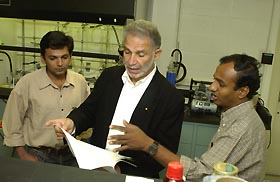|
This is an archived article.
For the latest news, go to the Advance
Homepage
For more archives, go to the Advance Archive/Search Page. |
||
|
Makriyannis Designing Molecules To Help
Fight Addiction, Combat Disease By Claudia G. Chamberlain
As director of UConn's Center for Drug Discovery, Makriyannis is intent on understanding the mechanisms of drugs of abuse, synthesizing new chemicals that will aid in the fight against drugs of addiction and developing better pharmaceuticals to combat disease.
In research conducted in collaboration with the Brookhaven National Laboratories in New York, Makriyannis is developing a new imaging agent. The potential, he says, is far reaching. Such a test could have significant diagnostic capabilities involving early detection of some degenerative diseases, such as Huntington's chorea and Alzheimer's. "The diagnostic testing will give doctors an early indication of these diseases long before there's massive degeneration," he says. In humane and painless experiments, baboons are injected with tiny amounts of radioactivity for an in vivo image of cannabinoid receptors in their brains. Cannabinoids are a class of molecules that interact with a biochemical system that was discovered just over a decade ago. The pioneering research is one of three major advances in Makriyannis' lab in the field of cannabinoids during the past several years. The second, made in collaboration with scientists at the University of California-Irvine, involves the discovery of an endocannabinoid transporter, a membrane protein shown to have a major role in regulating a number of physiological responses. This is being used as a therapeutic target for the development of medications used in the treatment of some disease conditions, including multiple sclerosis and peripheral circulatory complications. The third advance, Makriyannis' efforts in developing CB2 selective compounds - a subtype of the cannabinoid receptor - has led to a new approach in treating neuropathic pain that could bring significant relief to individuals suffering pain caused by diabetes, shingles, or cancer. "Our work with the cannabinoids is most advanced in the areas of neuropathic pain that doesn't respond well to most medications," Makriyannis says. "By targeting the CB2 receptor, we think we may have a way to counteract this kind of pain. Designing
Molecules Makriyannis has used various approaches to design the molecules, including computers and other experimental methods. "We make them or 'cook' them," he says, "and the molecules we make have different potential uses, either as research tools or as therapeutic agents." He says the challenge is to design a molecule that will fit in such a way on a human cell that it would turn certain cellular switches on or off. These switches could be receptors, enzymes, or transporters. The molecules must have the right shapes and electronic features in order to turn the appropriate switches on or off. "The molecules we design and make must be selective and potent," says Makriyannis. Scholar and
Mentor Makriyannis is one of the University's most successful researchers in obtaining research funding. He says the secret is "having ideas and making them interesting to the funding agencies. You have to show that you've used the funds well and have produced and invented new things." Major funding for his research comes from the National Institutes of Health, with additional grants from the State of Connecticut and the pharmaceutical industry. He currently directs a research group of 30 assistant professors, visiting scholars, postdoctoral fellows, and graduate students. He has also welcomed high school students into his labs. "Ultimately what gives this job its special flavor is the interaction with people," says Makriyannis. "One of the attractive features of being a scientist is that science eliminates lots of barriers between people - barriers of country, religion and age - because everyone is excited about what they're doing and the potential for making discoveries." Born to Greek parents in North Africa, Makriyannis says his father, a successful businessman in Egypt, encouraged him to pursue higher education. In 1960, Makriyannis fulfilled his father's dream, graduating from the University of Cairo with a degree in pharmaceutical chemistry. He then received a fellowship to study at the University of Kansas. Professor Edward Smissman, a pioneer in medicinal chemistry, not only offered him a full fellowship, he became Makriyannis' mentor. "Medicinal chemistry was a rapidly developing field at the time," says Makriyannis. He believes he was in the right place at the right time. During his career, Makriyannis has served as adviser and mentor to hundreds of students at the postdoctoral, graduate, and undergraduat e levels. Some of his former students now hold top industry posts. Stephen Fesik, who graduated in 1981 and was among the first graduate students Makriyannis mentored, has distinguished himself as a scientist and is currently divisional vice president of cancer research at Chicago-based Abbott Laboratories. Bonds between the two remain strong: Fesik has returned to UConn to give talks, and his former professor has met with Abbott's scientists. "Alex has a style that makes you think for yours ideas and then to follow up. Through his guidance, I learned to think about science." |
 team of chemists - students and fellows from
Australia, China, India, Greece, and France - work side by side in
a School of Pharmacy laboratory, manipulating and designing
molecules. They are learning from a world leader in drug discovery,
Alexandros Makriyannis, a professor of medicinal chemistry and
molecular and cell biology.
team of chemists - students and fellows from
Australia, China, India, Greece, and France - work side by side in
a School of Pharmacy laboratory, manipulating and designing
molecules. They are learning from a world leader in drug discovery,
Alexandros Makriyannis, a professor of medicinal chemistry and
molecular and cell biology.
